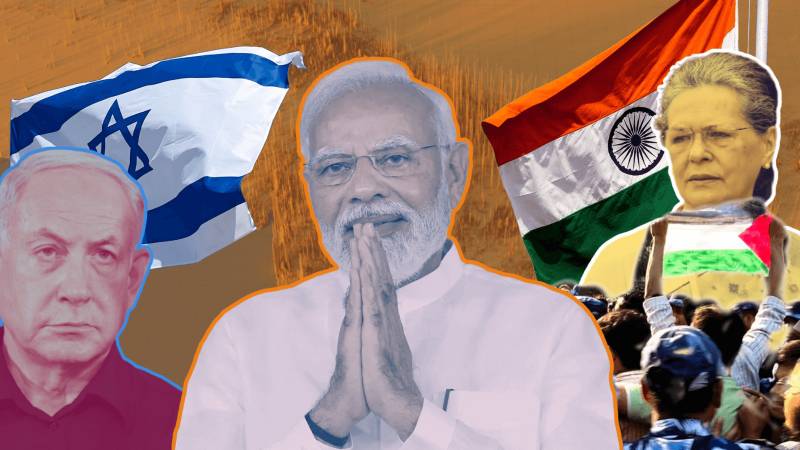
Hindu nationalists in India have long viewed Israel as a model of sorts. The Bharatiya Janata Party (BJP) patriarch Lal Krishna Advani established the Indo-Israel Friendship Group in Mumbai during the 1960s.
Despite this historical affinity, when the BJP eventually came to power in 1998 under Atal Bihari Vajpayee and later in 2014 under Narendra Modi, the official policy towards Israel and Palestine has remained consistent: support for the Palestinian cause and advocacy for a two-state solution.
Recently, however, the Modi government has adopted a more stringent stance domestically, arresting individuals under the Unlawful Activities (Prevention) Act (UAPA) for expressing support for Palestine and opposing Israel's military actions in Gaza. This raises an important question: Has India's official policy on Palestine changed?
Since the Hamas attack on southern Israel on October 7, 2023, India has supported five out of the six UN resolutions concerning the conflict, abstaining only on those which called for investigating Israel's actions. While this vote demonstrates a continuity in New Delhi's policy aimed at maintaining relations with West Asian allies, the domestic response, which the media has largely ignored, has been notably harsh.
In recent months, over 50 people across India have been arrested under anti-terror laws for displaying Palestinian flags or expressing solidarity with the Palestinian cause. These arrests have occurred not only in places like Kashmir and Hyderabad but also in states like Bihar, Jharkhand, Uttar Pradesh, and Madhya Pradesh, highlighting a nationwide crackdown. More than 30 individuals were detained for raising the Palestinian flag during the recent Muharram processions.
The act of waving the Palestinian flag in India has evolved from a gesture of support for Palestine and the freedom movement there to a symbol of protest and emotional outpouring. As Nadeem Khan, founder of the India-Palestine Friendship Forum, puts it, "Waving the Palestinian flag in India today is not just about supporting Palestine; it symbolises a struggle. For many, it represents a personal emotional response or solidarity with the Palestinian cause."
Historically, India has been a staunch supporter of Palestine. In 1948, India was the only non-Arab country to vote against the UN General Assembly's partition plan, which led to the creation of Israel. Even during Israeli Prime Minister Ariel Sharon's visit to India in 2003, the Indian government resisted pressure to alter its stance on Palestine. Prime Minister Atal Bihari Vajpayee, however, decided that India's relationship with Israel would not come at the expense of its support for Palestine.
In 2008, India further demonstrated its commitment by gifting a prime piece of land in New Delhi to the Palestinian National Authority (PNA) for its embassy and provided $20 million in assistance.
Today, while India's official policy towards Palestine has ostensibly remained the same, the nature of its relationship with Israel has evolved significantly. The ties now extend beyond arms procurement to include intelligence sharing and training, reflecting a deeper strategic partnership.
Prime Minister Modi's condemnation of the Hamas attacks in October 2023 and India's decision to dispatch humanitarian aid to Gaza has been paired with an abstention from a UN resolution calling for a ceasefire, underscoring a nuanced position
The right-wing narrative in India, however, has increasingly framed support for Palestine as being synonymous with supporting Indian Muslims, contributing to Islamophobic sentiments. Social media has played a role in amplifying this narrative, with pro-Israel comments in Hindi frequently echoing the views of right-wing groups aligned with the BJP.
Ironically, while the Rashtriya Swayamsevak Sangh (RSS) and its founders once admired Nazi Germany for its anti-Semitic policies, the current alignment with Israel's Zionist goals somehow mirrors RSS's vision of a Hindu Rashtra.
Prime Minister Modi's condemnation of the Hamas attacks in October 2023 and India's decision to dispatch humanitarian aid to Gaza has been paired with an abstention from a UN resolution calling for a ceasefire, underscoring a nuanced position.
The domestic political landscape benefits the ruling party's narrative.
The Congress party's top leadership, in contrast, is maintaining a firm stance in support of Palestine. But, senior Indian politician KC Tyagi, who has been associated with the Palestine cause, says that India's proximity with Israel began during the Congress party rule. "India's engagement with Israel increased during the tenure of Congress Prime Minister PV Narasimha Rao," he said. India opened an Embassy in Tel Aviv during Rao's leadership.
Congress party leaders like Sonia Gandhi and her daughter Priyanka Gandhi have openly criticised Israeli actions. Priyanka Gandhi's condemnation of Israeli Prime Minister Benjamin Netanyahu's rhetoric, which framed the conflict as a "clash between barbarism and civilisation," highlights the ongoing political tension.
Sonia Gandhi recently wrote in a column in one of India's English language dailies that Israel was just trying to extract revenge from innocent, helpless people. "The power of the Israeli state is now focused on exacting revenge from a population that is largely as helpless as it is blameless. The destructive might of one of the world's most potent military arsenals is being unleashed upon children, women and men who have no part in the Hamas assault; they, instead, for the most part, have been at the heart of decades of discrimination and suffering," she wrote.
But surprisingly, at the official level, the Congress party has largely refrained from adopting a stance on the issue, with only the Gandhis voicing strong opposition.
It looks as if the political discourse within the party remains fragmented on the issue.
Meanwhile, in the current political climate, displaying a Palestinian flag can lead to an arrest, whereas showing support for Israel or the United States appears less contentious.
This dichotomy reflects a broader shift in India's domestic and international policies, suggesting that while historical support for Palestine endures, the political landscape is increasingly influenced by domestic imperatives and strategic partnerships.

